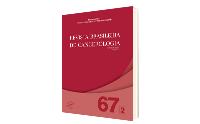Nutritional Care in Hospitalized Patients with Breast Cancer and COVID-19
DOI:
https://doi.org/10.32635/2176-9745.RBC.2021v67n2.1351Keywords:
Breast Neoplasms, Coronavirus Infections, Food Service, Hospital, Nutritional SupportAbstract
Introduction: Cancer patients are more susceptible to infection and to the greatest severity of the disease caused by the new coronavirus (COVID-19). Objective: To present the scenario of nutritional care, clinical and nutritional profile of patients hospitalized with COVID-19 in a breast cancer treatment institution. Method: The nutritional care practices performed at the Hospital of Cancer III of the National Cancer Institute José Alencar Gomes da Silva (HC III/INCA) during the COVID-19 pandemic were presented. Clinical data from patients with breast cancer and COVID-19 were collected from medical records. Results: Some changes in the routine were the suspension of consultations with the nutritionists in confirmed cases, the use of personal protective equipment and changes in nutritional assessment. A total of 23 patients were included, hypertension was the most frequent comorbidity (56.5%), and the most frequent clinical staging was IV (43.5%). Dyspnea (60.9%), fever (30.4%), cough (13%), anemia, neutrophilia, high C-reactive protein, hypoalbuminemia and need for oxygen therapy during hospitalization (73,9%) were the main characteristics found. The majority received a liquid oral diet (52.2%) and 43.5% were prescribed a nutritional supplement. Overweight was the most prevalent nutritional status. Conclusion: In addition to breast cancer, an increased risk of complications from COVID-19 in these patients was associated with high prevalence of comorbidities, overweight and lung metastasis. The presence of symptoms influencing food intake led to the necessity of changes in the diet for better food acceptance.









